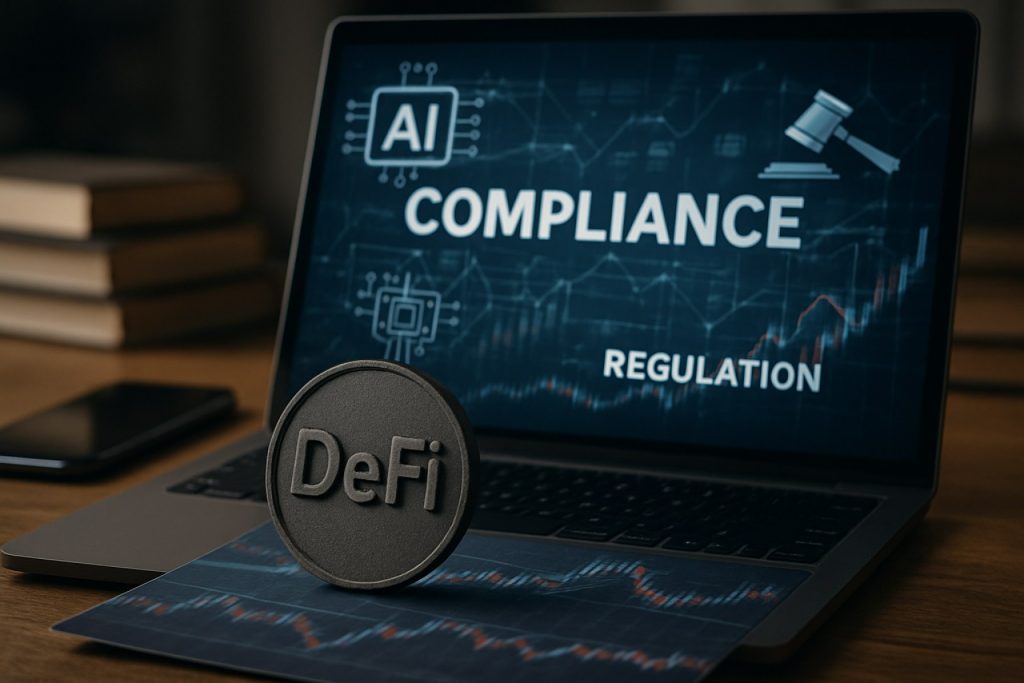
Decentralized Finance Compliance Solutions Market Report 2025: In-Depth Analysis of Technology Trends, Regulatory Drivers, and Global Growth Opportunities. Discover How AI and Evolving Regulations Are Shaping the Future of DeFi Compliance.
- Executive Summary & Market Overview
- Key Technology Trends in DeFi Compliance Solutions
- Competitive Landscape and Leading Solution Providers
- Market Growth Forecasts 2025–2030: CAGR, Revenue, and Adoption Rates
- Regional Analysis: North America, Europe, APAC, and Emerging Markets
- Future Outlook: Innovations and Strategic Roadmaps
- Challenges, Risks, and Opportunities in DeFi Compliance
- Sources & References
Executive Summary & Market Overview
Decentralized Finance (DeFi) compliance solutions are rapidly emerging as a critical segment within the broader blockchain and financial technology landscape. DeFi refers to financial services built on blockchain networks, primarily Ethereum, that operate without traditional intermediaries. As the DeFi ecosystem has grown—reaching a total value locked (TVL) of over $60 billion by early 2025—regulatory scrutiny has intensified, driving demand for robust compliance tools tailored to decentralized protocols DefiLlama.
The market for DeFi compliance solutions encompasses technologies and services designed to help decentralized applications (dApps), protocols, and users adhere to anti-money laundering (AML), know-your-customer (KYC), and other regulatory requirements. Unlike traditional finance, DeFi’s pseudonymous and permissionless nature presents unique compliance challenges, including the identification of counterparties, transaction monitoring, and sanctions screening. In response, a new wave of compliance providers has emerged, offering on-chain analytics, identity verification, and risk assessment tools specifically for DeFi platforms.
Key players in this market include Chainalysis, TRM Labs, and Elliptic, all of which have expanded their product suites to address DeFi-specific risks. These companies leverage advanced blockchain analytics, machine learning, and integrations with smart contracts to deliver real-time compliance monitoring and reporting. Additionally, decentralized identity solutions, such as those developed by Spruce and Sismo, are gaining traction as protocols seek to balance regulatory requirements with user privacy.
- In 2025, regulatory bodies such as the Financial Action Task Force (FATF) and the Financial Industry Regulatory Authority (FINRA) have issued updated guidance targeting DeFi, prompting increased adoption of compliance solutions.
- Market research from Gartner and Mordor Intelligence projects the DeFi compliance solutions market to grow at a CAGR exceeding 30% through 2028, driven by regulatory pressure and institutional participation.
- Integration of compliance tools is becoming a prerequisite for DeFi protocols seeking to attract institutional capital and operate in regulated jurisdictions.
In summary, the DeFi compliance solutions market in 2025 is characterized by rapid innovation, regulatory-driven growth, and increasing convergence between decentralized protocols and traditional compliance standards. This dynamic environment is expected to further accelerate as global regulators clarify their positions and as DeFi matures into a mainstream financial sector.
Key Technology Trends in DeFi Compliance Solutions
Decentralized Finance (DeFi) compliance solutions are rapidly evolving in response to increasing regulatory scrutiny and the growing complexity of decentralized protocols. In 2025, several key technology trends are shaping the landscape of DeFi compliance, aiming to balance regulatory requirements with the core principles of decentralization and user privacy.
- On-Chain Analytics and Transaction Monitoring: Advanced on-chain analytics tools are being widely adopted to monitor transactions in real time, detect suspicious activities, and trace the flow of funds across DeFi protocols. These solutions leverage machine learning and artificial intelligence to identify patterns indicative of money laundering or illicit behavior, as seen in platforms developed by Chainalysis and Elliptic.
- Decentralized Identity (DID) and Zero-Knowledge Proofs (ZKPs): The integration of decentralized identity frameworks and zero-knowledge proofs is enabling privacy-preserving Know Your Customer (KYC) and Anti-Money Laundering (AML) processes. Solutions such as Spruce and ZKProof allow users to prove compliance without revealing sensitive personal information, addressing both regulatory and privacy concerns.
- Automated Compliance via Smart Contracts: Compliance logic is increasingly being embedded directly into smart contracts, automating processes such as sanctions screening, transaction limits, and whitelisting. This trend is exemplified by projects like OpenZeppelin, which provides audited smart contract libraries with built-in compliance modules.
- Regulatory Reporting APIs and Interoperability: New API standards and interoperability protocols are emerging to facilitate seamless data sharing between DeFi platforms and regulatory bodies. Companies like TRM Labs are developing solutions that enable real-time regulatory reporting while maintaining the composability of DeFi ecosystems.
- Cross-Chain Compliance Solutions: As DeFi expands across multiple blockchains, cross-chain compliance tools are gaining traction. These solutions, such as those from Fireblocks, provide unified compliance monitoring and risk assessment across diverse blockchain networks.
These technology trends reflect the DeFi sector’s commitment to addressing regulatory challenges while preserving the decentralized ethos. The convergence of privacy-enhancing technologies, automation, and interoperability is expected to define the next generation of DeFi compliance solutions in 2025 and beyond.
Competitive Landscape and Leading Solution Providers
The competitive landscape for Decentralized Finance (DeFi) compliance solutions in 2025 is rapidly evolving, shaped by increasing regulatory scrutiny and the growing institutional adoption of DeFi protocols. As global regulators intensify their focus on anti-money laundering (AML), know-your-customer (KYC), and counter-terrorism financing (CTF) requirements, solution providers are racing to deliver robust, scalable, and interoperable compliance tools tailored for decentralized environments.
Key players in this space include both established blockchain analytics firms and innovative startups. Chainalysis and Elliptic have extended their traditional transaction monitoring and wallet screening services to DeFi protocols, offering real-time risk scoring and on-chain analytics that help platforms identify suspicious activity without compromising user privacy. TRM Labs has also emerged as a leader, providing DeFi-native compliance solutions that integrate seamlessly with smart contracts and decentralized applications (dApps).
Specialized providers such as Solidus Labs focus on market surveillance and transaction monitoring specifically for DeFi, addressing the unique risks posed by automated market makers (AMMs), decentralized exchanges (DEXs), and liquidity pools. Meanwhile, Coinfirm offers a suite of compliance tools, including DeFi protocol risk assessments and automated reporting, catering to both protocol developers and institutional investors.
A notable trend in 2025 is the rise of on-chain KYC solutions, such as those developed by Fractal ID and Iden3, which leverage zero-knowledge proofs and decentralized identity standards to enable user verification while preserving anonymity. These solutions are gaining traction among DeFi platforms seeking to balance regulatory compliance with the ethos of user privacy.
- Integration with existing DeFi infrastructure is a key differentiator, with leading providers offering APIs and SDKs for seamless adoption.
- Interoperability across multiple blockchains (Ethereum, BNB Chain, Polygon, etc.) is increasingly important as DeFi expands beyond Ethereum.
- Regulatory technology (RegTech) partnerships are emerging, with compliance providers collaborating with legal and audit firms to offer end-to-end solutions.
As the DeFi compliance market matures, competition is expected to intensify, with solution providers investing in advanced analytics, privacy-preserving technologies, and global regulatory coverage to capture a growing client base of protocols, exchanges, and institutional participants.
Market Growth Forecasts 2025–2030: CAGR, Revenue, and Adoption Rates
The market for Decentralized Finance (DeFi) compliance solutions is poised for robust growth between 2025 and 2030, driven by increasing regulatory scrutiny, institutional adoption, and the maturation of DeFi protocols. According to projections by Grand View Research, the global DeFi market is expected to expand at a compound annual growth rate (CAGR) exceeding 40% during this period, with compliance solutions representing a significant and rapidly growing segment within this ecosystem.
Revenue generated by DeFi compliance solution providers is forecasted to surpass $2.5 billion by 2030, up from an estimated $400 million in 2025. This surge is attributed to the proliferation of anti-money laundering (AML), know-your-customer (KYC), and transaction monitoring tools tailored for decentralized protocols. The adoption rate of compliance solutions among DeFi platforms is projected to rise from approximately 18% in 2025 to over 55% by 2030, as regulatory frameworks such as the EU’s Markets in Crypto-Assets Regulation (MiCA) and the U.S. Financial Action Task Force (FATF) guidelines become more strictly enforced and globally harmonized (Financial Action Task Force).
Key drivers of this growth include:
- Heightened regulatory pressure on DeFi protocols to implement robust compliance measures, especially in major markets such as the EU, U.S., and Asia-Pacific.
- Increased institutional participation in DeFi, necessitating enterprise-grade compliance infrastructure.
- Technological advancements in on-chain analytics, identity verification, and smart contract auditing, enabling more seamless integration of compliance tools.
Leading solution providers such as Chainalysis, TRM Labs, and Elliptic are expected to capture significant market share, leveraging their expertise in blockchain analytics and regulatory technology. Furthermore, partnerships between DeFi protocols and compliance technology firms are anticipated to accelerate, fostering a more secure and transparent ecosystem.
In summary, the period from 2025 to 2030 will likely witness exponential growth in the DeFi compliance solutions market, underpinned by regulatory developments, technological innovation, and the mainstreaming of decentralized finance.
Regional Analysis: North America, Europe, APAC, and Emerging Markets
The global landscape for Decentralized Finance (DeFi) compliance solutions in 2025 is marked by significant regional variations, shaped by regulatory frameworks, technological adoption, and market maturity. North America, Europe, Asia-Pacific (APAC), and emerging markets each present distinct opportunities and challenges for DeFi compliance providers.
North America remains at the forefront of DeFi compliance innovation, driven by the United States’ proactive regulatory stance and the presence of major blockchain hubs. The U.S. Securities and Exchange Commission (SEC) and the Financial Crimes Enforcement Network (FinCEN) have intensified scrutiny of DeFi protocols, prompting a surge in demand for robust Know Your Customer (KYC), Anti-Money Laundering (AML), and transaction monitoring solutions. Leading compliance technology vendors, such as Chainalysis and TRM Labs, have expanded their offerings to address evolving regulatory requirements, while partnerships with traditional financial institutions are accelerating mainstream adoption.
Europe is characterized by a harmonized regulatory approach, particularly with the implementation of the Markets in Crypto-Assets (MiCA) regulation. The European Union’s focus on consumer protection and financial stability has led to the integration of compliance tools directly into DeFi platforms. Companies like Elliptic are collaborating with European exchanges and DeFi projects to ensure adherence to MiCA and the Fifth Anti-Money Laundering Directive (5AMLD). The region’s emphasis on privacy and data protection also drives demand for compliance solutions that balance regulatory obligations with user confidentiality.
APAC is experiencing rapid DeFi growth, particularly in Singapore, Hong Kong, and South Korea, where regulators are fostering innovation while tightening oversight. The Monetary Authority of Singapore (MAS) and the Hong Kong Securities and Futures Commission (SFC) have issued guidelines for DeFi compliance, spurring local startups and global firms to develop region-specific solutions. Merkle Science and other regional players are gaining traction by offering customizable compliance frameworks tailored to diverse regulatory environments across APAC.
Emerging markets in Latin America, Africa, and parts of Eastern Europe are leveraging DeFi to address financial inclusion gaps. However, limited regulatory clarity and infrastructure pose challenges for compliance solution adoption. International organizations, such as the Financial Action Task Force (FATF), are working with local authorities to establish baseline standards, while global compliance providers are adapting their offerings to support risk-based approaches suitable for these markets.
Future Outlook: Innovations and Strategic Roadmaps
The future outlook for decentralized finance (DeFi) compliance solutions in 2025 is shaped by rapid technological innovation, evolving regulatory frameworks, and the increasing institutionalization of DeFi markets. As DeFi platforms continue to attract significant capital and user participation, the demand for robust compliance infrastructure is intensifying. This is particularly relevant as global regulators, such as the Financial Action Task Force (FATF) and the U.S. Securities and Exchange Commission (SEC), signal stricter oversight of decentralized protocols and digital asset transactions.
Innovations in DeFi compliance are expected to focus on integrating advanced identity verification, transaction monitoring, and risk assessment tools directly into decentralized applications (dApps) and smart contracts. Solutions leveraging zero-knowledge proofs and privacy-preserving technologies are gaining traction, enabling platforms to verify user credentials and transaction legitimacy without compromising user privacy. Companies like Chainalysis and TRM Labs are expanding their blockchain analytics offerings to cover a broader range of DeFi protocols, providing real-time risk scoring and suspicious activity detection tailored for decentralized environments.
Strategically, DeFi projects are increasingly adopting modular compliance frameworks that allow for flexible adaptation to jurisdiction-specific requirements. This includes the implementation of on-chain KYC/AML modules, decentralized identity (DID) solutions, and automated regulatory reporting tools. The emergence of “compliance-as-a-service” platforms, such as those developed by Solidus Labs, is expected to accelerate, offering plug-and-play compliance layers that can be integrated with existing DeFi infrastructure.
Looking ahead to 2025, industry roadmaps indicate a convergence between DeFi and traditional finance (TradFi) compliance standards. Collaborative initiatives, such as the Global Digital Finance (GDF) code of conduct, are fostering interoperability and standardization across the sector. Additionally, the adoption of decentralized autonomous organizations (DAOs) for governance is prompting the development of compliance protocols that can be enforced through community consensus and smart contract automation.
Overall, the future of DeFi compliance solutions will be defined by a balance between regulatory adherence and the preservation of decentralization principles. Market participants who proactively invest in innovative, scalable compliance technologies are likely to gain a competitive edge as regulatory clarity and institutional participation in DeFi continue to grow.
Challenges, Risks, and Opportunities in DeFi Compliance
Decentralized Finance (DeFi) compliance solutions are rapidly evolving to address the unique regulatory, operational, and technological challenges inherent in decentralized ecosystems. As DeFi platforms continue to disrupt traditional financial services, the need for robust compliance frameworks has become paramount, especially in light of increasing regulatory scrutiny and the growing sophistication of illicit activities within the sector.
One of the primary challenges in DeFi compliance is the pseudonymous nature of blockchain transactions, which complicates Know Your Customer (KYC) and Anti-Money Laundering (AML) processes. Unlike centralized exchanges, DeFi protocols often lack intermediaries, making it difficult to implement traditional compliance checks. This has led to the emergence of on-chain analytics and identity solutions, such as those offered by Chainalysis and TRM Labs, which leverage machine learning and blockchain data to monitor transactions and flag suspicious activity.
Regulatory uncertainty remains a significant risk for DeFi compliance. Jurisdictions such as the United States and the European Union are actively developing frameworks to govern DeFi activities, including the application of the Financial Action Task Force (FATF) Travel Rule and the EU’s Markets in Crypto-Assets Regulation (MiCA). However, the decentralized and borderless nature of DeFi complicates enforcement and creates legal ambiguities for protocol developers and users alike. According to Elliptic, regulatory actions in 2024 led to a surge in demand for compliance solutions that can adapt to evolving legal requirements.
Despite these challenges, significant opportunities exist for compliance solution providers. The integration of decentralized identity (DID) protocols, such as those developed by Spruce, enables privacy-preserving KYC, allowing users to prove compliance without revealing unnecessary personal information. Additionally, the rise of compliance-as-a-service platforms is lowering the barrier for DeFi projects to implement robust compliance measures, fostering greater institutional participation and mainstream adoption.
- Challenges: Pseudonymity, lack of intermediaries, regulatory uncertainty, and cross-border enforcement.
- Risks: Legal liabilities, reputational damage, and potential exclusion from regulated markets.
- Opportunities: On-chain analytics, decentralized identity, compliance-as-a-service, and increased institutional engagement.
As the DeFi landscape matures in 2025, the interplay between innovative compliance solutions and evolving regulatory frameworks will be critical in shaping the sector’s growth and legitimacy.
Sources & References
- Chainalysis
- TRM Labs
- Elliptic
- Spruce
- Sismo
- Financial Industry Regulatory Authority (FINRA)
- Mordor Intelligence
- ZKProof
- OpenZeppelin
- Solidus Labs
- Iden3
- Grand View Research
- Merkle Science



